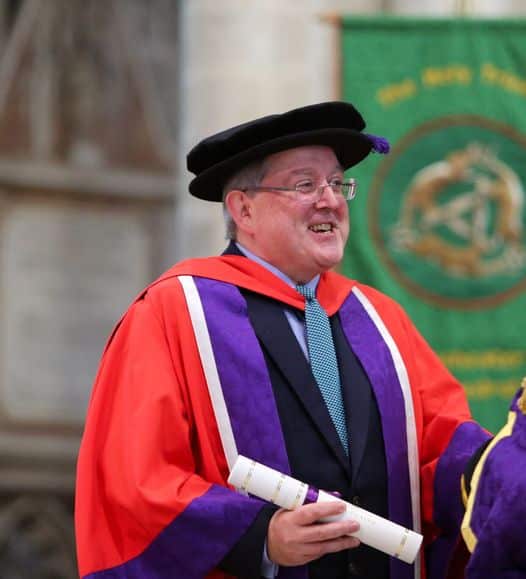Roger Scruton sings the praises of the musical avant-garde
mainThe ultra-conservative philosopher was invited to speak at the Donaueschingen festival, birthplace of post-war musical modernism. Being English, he was very polite to them in his opening remarks.
Then he put the boot in.
Important composers from Schoenberg and Stravinsky to Ligeti and Stockhausen, have been premiered in this place and before this audience. Along with Darmstadt, Donaueschingen has helped to restore Germany to the central place in European musical culture that it has occupied in the past and will always deserve. Now, in its latest and securest phase as the Musiktage, the Donaueschingen festival has become a symbol of musical modernism, and it is a great honour to be invited to speak from this podium to one of the most educated musical audiences in the world today. But in this short talk I will try to outline why I question the prominence in our musical culture of the experimental avant-garde….
Read full text here.

For example:
The contrary obstacle also lies before us: the dictatorship of the difficult. Bureaucrats charged with giving support to the arts are, today, frightened of being accused of being reactionary. I suspect that everyone in this room is frightened of being accused of being reactionary. The history of the French salons in the 19th century, and of the early reactions to musical and literary modernism, has made people aware of how easy it is to miss the true creative product, and to exalt the dead and the derivative in its stead. The safest procedure for the anxious bureaucrat is to subsidize music that is difficult, unlikely to be popular, even repugnant to the ordinary musical ear. Then one is sure to be praised for one’s advanced taste and up-to-date understanding. Besides, if a work of music is easy to assimilate and clearly destined to be popular it does not need a subsidy in any case.
Discuss.





“Besides, if a work of music is easy to assimilate and clearly destined to be popular it does not need a subsidy in any case.”
The last paragraph. That’s where it all goes wrong. It’s a common mistake to think in terms of there only being the obscure, inaccessible, intellectually advanced on the one hand, and everything else is easy, popular and guaranteed financially lucrative. This is simply not the case, there are no clearly defined boundaries. Musical history is also riddled with cases where works that should have been “clearly destined to be popular” were for some reason not recognised at the time. Elgar’s Cello Concerto is one that comes to mind…
Still, the rest of what he says is absolutely and utterly true. I live this everyday…
One should understand the context: Scruton’s lecture was a trojan horse. If Luther had been invited by the Vatican, he would not have begun his speech at the banquet with saying they were all criminals and their religion crap. To have an effect, he would have to express his observations politely and respectfully.
Scruton explained the difference between sound and a musical tone, the first being the acoustical thing, and the second: part of an interrelated system of music as an art form. It is a normal distinction which is taken for granted by audiences, brought-up on music: they do not find pure sound very interesting. Sonic audiences are fond of pure sound and therefore they flock to the Donaueschingen Musiktage, nothing wrong with it, but calling Klangkunst music is obviously missing the point of both pure sound and music.
Scruton’s observations and arguments are, by the way, not conservative or reactionary at all, but demonstrate understanding of both music and sonic art, as his ‘Aesthetics of Music’ amply attests (Oxford University Press). When conservative philosophers show such understanding, it is to their credit, and it does not suddenly make the distinction ‘conservative’. Smuggling Klangkunst into the realm of music is not renewal but destructive for both art forms, as has the past half century shown.
‘Sir’ Roger Scruton to you, Norman!
He was knighted last week.
aha! missed that…
I’m dazed to hear that.
It’s true that the people who make the decisions as to how and where money is allocated often have poor musical knowledge and judgment — if any at all, indeed. This whole debate is ultimately about what’s fashionable and socially acceptable, which is unfortunately how subsidies are decided and where money often goes. There was a time not too long ago when writing an octave would have been considered anathema in the music world, luckily we have moved on from that. Scruton makes the point that even when composers wanted to be innovative, they still remained indebted to tonality, as in Schoenberg’s expression “floating tonality” which he quotes. The point being that music can still be tonal, or rather contain what one might call tonal “centers” or references, without being based on one main key. The modern belief that tradition can be jettisoned once and for all (Descartes in philosophy, Schoenberg in music with serialism) has proven rather naive, for we are always indebted in tradition, whether we are aware of it or not, and perhaps especially more so when we are not aware of it, for tradition is so imbedded within our being that it takes literally work to bring it to awareness. The human ear, or shall we say at the very least the western ear, is instinctively geared towards tonal references. This is why even people without any musical knowledge whatsoever can immediately detect when something is out of tune and simply “doesn’t fit.” This was one of the seminal points made by Jerome Ducros in his famous lecture on atonality at the Collège de France, which drew the ire of many in the Parisian musical world at the time, perhaps because they knew too well he was making a perfectly valid point. There is a reason why most people cannot listen to and genuinely enjoy, at least for a very long time, to a piece such as Le Marteau Sans Maître, whereas they come time and again to a Beethoven or a Mahler symphony, or even to some of Pink Floyd’s masterful albums: that’s because these works are intelligible, whereas much of contemporary music does not provide such intelligibility and becomes quickly frustrating, as little meaning can be derived from it. It can not be “followed” — the equivalent would be reading a book with unintelligible sentences, one would quickly put it down. It has always struck me that the abandonment of tonality still wanted to retain the old 12-tone equal temperament — in other words the very building block of tonality, where some tones attract others while others repel each other, and where tensions call for resolutions. Shouldn’t a truly new musical language have abandoned such temperament and resorted to the finest variations in pitch, such as quarter-tone and possibly even smaller? Well, we actually have had such works and know how they sound and know how much satisfaction we can derive from them. Atonal music, especially when wholly deprived of any tonal references, just doesn’t work, which is perhaps why we have witnessed such a remarkable recrudescence of tonality in the past 20 years or so. There is a perfectly valid reason why a Handel aria immediately speaks to most people, whereas their attention struggles to be sustained while listening to much of the music paradoxically labeled “contemporary,” as it really has failed to speak to its contemporaries outside the the insular world of fashionable musical outings.
Canadian musicologist Herbert Pauls has carried-out extensive research into 20C music which demonstrates that the tonal tradition never really stopped, but was put out of sight by academia and promotors, under the pressures of a progressivist ideology:
http://www.musicweb-international.com/books/Pauls_two_centuries_in_one.pdf
In the USA, there have been, and still are, many composers who wrote and write a new (modern!) music still firmly rooted in tadition and tonality, without imitating the past. And in France, the recent emergence of brilliant composers like Nicolas Bacri, Richard Dubugnon, Guillaume Connesson and Karol Beffa show that the musical spirit has not died but merely went underground, and is appearing again.
http://www.youtube.com/watch?v=o-wEqheT9is
http://www.youtube.com/watch?v=wWjSJri3NcE
I can never think of Roger Scruton without thinking of the secret payments he took from Japan Tobacco to plant pro-smoking articles in high profile newspapers. The Guardian exposed it in 2002.
The payments were not secret, but just normal payments like any fee for services. And the articles were protesting gestures against the totalitarian PC culture hysteria raging around which wanted to remove individual responsibilities from civilians.
And then, being intoxicated by the gentle smoke of a havanna, anybody would be in danger of making such mistakes.
Think of what it means if a big public newspaper hacks private email correspondence to nail deviant philosophers to the cross of the PC inquisition.
The payments were not secret, it was just that no-one knew about them.
The tobacco componany didn’t know about them too, so the whole story goes-up in smoke.
“The payments came to light when a September 2001 email from the Scrutons to JTI was leaked to The Guardian. Signed by Scruton’s wife, it asked the company to increase their £4,500 monthly fee to £5,500.”
As far as I know, that ‘deal’ never realised. The articles were a plan, nothing more.
I am a fan of Scuton’s philosophy of beauty and music, not his politics (especially not his lust of blood sport). I do detest atonal and 12-tone music though. Much of the so-called Avant Garde seems a painfully self-conscious assault on beauty, kindness, and basic decency. As modern life is filled with ugliness and violence, I fail to see the value in adding yet more to the mix.
Much of the musical Avant-garde are delighted that very few listen to their music. It validates their feeling of cultural superiority. Any pleb on the bus or in the supermarket can enjoy Mozart or Beethoven, but Boulez will sort them out
As for Sir Roger’s supposed bloodlust, I feel I have to repudiate such petulant expostulations. Outsiders have no idea where fox hunting is about – I have to admit: was, because of the 2004 ban, which we all bitterly regret here in [redacted] …. (but we hunt anyway, secretly, so don’t tell anybody). To begin with, foxes are never killed, because we made an agreement in 1983 that if they would reduce their inroads into our life stock, we would stop at their hole’s entrance. And then, fox hunting is not about the fox but about fittnes training for our horses, and about adding artistic colour to the shires, by dressing-up like the old engravings and paintings which form such an important part of our cultural identity and raging through the picturesque country perspectives: it is a wild but sophisticated obstacle race, with all the British irregularities sprinkled over the landscape. The pre- and after-hunt receptions are the glue which binds the community of country gentlemen and ladies together, the distances between the settlements being quite considerable, so all in all the only red fluids flowing on such occasions are the wine and port, to which hardly any objection could have civilizational validity.
And the relevance of all this to music/atonalism/modernism/ is …?
The Donaueschingen Musiktage is, together with the Darmstadt Summer Courses and festivals like Merz Musik and the Munich Biennale, and a couple of other places where the old fogeys of postwar idealism get together, a hotbed of self-inflicted Zeitgeist delusions, to feed the followers with an extra shot of the Hegelian idea that history has an in-built dynamic independent from human anction. So, the script of this sect says that after WW II, under the pressures of the Zeitgeist, music left the past with its bourgeois romanticism of expression and soul and tonality behind and entered a truly modern stage of pure material research – i.e. exploration of sound as such, liberated from mouldy notions like ‘art’ and ‘humanism’ (since they have not been able to stop two world wars and the holocaust). On top of the priority list stood ‘transgression of boundaries’ because it is at those barricades where avantgardist heroism is located. When there remained nothing left to transgress, festivals like Donaueschingen got into pop and Schlager (the German form of country & western but worse, much worse). When even THAT began to be felt like an end point instead of opening new doors to transgression, and even leftwing feminist attacks upon patriarchal, anti-democratic music got conventional and dusty, like the works of [redacted], and nothing seemed to inspire to debate – which has always been very popular with postwar modernism, more so than the works themselves – in despair the festival board invited the man who had launched the first profound critique of modernism in his ‘Aesthetics of Music’. Of course his lecture was fiercely criticized, but the very fact that Scruton had been invited at all, is a sign that even in the last bulwarks of postwar modernism, some doubt has crept in.
At the bottom of this post some media reactions can be found:
http://subterraneanreview.blogspot.nl/2016/12/scruton-at-donaueschingen-festival.html
I was referring to your defence of Scruton’s supposed bloodlust.
Not even Luigi Nono could write a real revolutionary song in microtones.